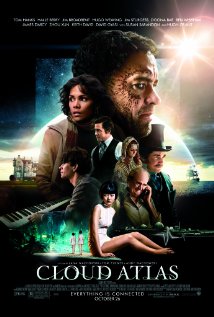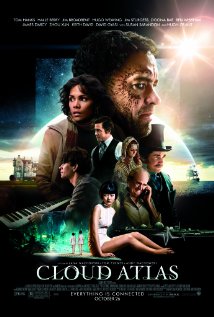Cloud Atlas (2013)
 It’s not often that I get to see a movie based on a novel I haven’t read. I am a voracious reader, but I do not like going to the movies. Cloud Atlas gave me that chance: I had read about the novel only in passing, but the movie was front and center on the Amazon home screen. A perfect opportunity!
It’s not often that I get to see a movie based on a novel I haven’t read. I am a voracious reader, but I do not like going to the movies. Cloud Atlas gave me that chance: I had read about the novel only in passing, but the movie was front and center on the Amazon home screen. A perfect opportunity!
I hear the novel was not doing so well, until it hit China and then it became a huge hit. Reading about the structure, I make sense of the cultural difference that could lead to different acceptance.
The novel is a cheap read, apparently, because the author wrote not one, but six independent stories and joined them in a very creative fashion. The plot starts out in the South Pacific in 1850. It’s a fanciful plot of betrayal and greed. About half-way through this story – poof, it turns out the whole thing was just something someone else read in 1931. That someone else has an own story that goes to the half-way mark, and then it turns out that this story was something read by someone in 1975.
This goes on until the last (sixth) story, which is set in the future and has a fighting chance to find an end. After the end of this story, the end of the story before is told, followed by the story before it. At the end, we hear the second half of the first story, the one set in the South Pacific in 1850.
Now, I could see how a reader might not like this setup. By the time the South Pacific comes back, I would have completely forgotten the original story – and frankly not cared a whole lot anymore. The author might be a wizard at story-telling, but I find the challenge gratuitous and unworthy of the effort for both writer and reader.
Why the author didn’t decide to tell the stories the other way around, as successive flashbacks that go back in time, I will never know. That setup would have worked much better, because you might have required the reading of the older story to understand the newer one – and maybe solve a mystery in it. But by choosing reverse “Memento” chronology, you end with a static story that can have no recollection (because it’s before them) of the ones to come – that have already come.
The movie, thankfully, tells the stories in parallel. That is a brilliant move, because it makes the plot mysterious. You do not know, at first, why serendipities occur. You do not know that the characters in each plot matter to each other’s lives in oblique ways. You are just sitting there with more and more puzzling things occurring, and you need to wait for all the pieces to be put in place for the whole puzzle to make sense.
A more daring choice made was that to cast the same actors for different parts in the different stories. Sometimes you know it’s the same actor, but sometimes they are under heavy makeup or under masks, and you wouldn’t know. It’s a great way to get more famous actors on board, as they get larger parts and more variety. It works, but is also a little confusing, as it’s not clear if the same faces staring at you mean something particular.
Critics didn’t particularly like Cloud Atlas. Complaints range all over the map, but they seem to boil down to, “too complicated.” The consensus on Rotten Tomatoes is:
Its sprawling, ambitious blend of thought-provoking narrative and eye-catching visuals will prove too unwieldy for some, but the sheer size and scope of Cloud Atlas are all but impossible to ignore.
I had quite the opposite impression. Cloud Atlas didn’t just excite me, it seemed to be a movie of the future. I happened to watch the Hugh Jackman / Nicole Kidman vehicle Australia next, and it simply felt old-style, because it was so linear and “dull.” I am sure it was a fine movie, but the contrast was startling. I wanted more movies like Cloud Atlas, not more like Australia.
I had a similar feeling when I started watching “old” movies from the 80s and 90s. Even the really good ones all suffer from similar problems in story-telling: they take forever to get going, they introduce the clean pre-plot world for too long, and as they get faster they barely reach a pace that you’d feel comfortable with. In short, they are boring and dull in the beginning, and when things start happening, you have probably already fallen asleep.
Now, Cloud Atlas is a standout right now. There are no other movies like it, and there aren’t a whole lot of stories like it in print, either. There are flashbacks, for sure (I wrote a lengthy one for In the Mission); but they are typically plot augmentation devices. There are time travel stories, but they invariably end up in a tragic mess, unless they are about a single time jump (and possibly a return journey). When they start introducing multiple locations and times, they get messy – as was the case with Heroes, whose interesting premise got killed in the second season, when you couldn’t save yourself from the time-hopping Hiro.
Aside from the general direction of the movie, which was incredibly exciting for the future of film and narration in general, there were other aspects of it that were very appealing. Several of the actors gave outstanding performances. I’ll particularly highlight the incredible Jim Broadbent, whose ability to glom to a variety of characters is unmatched. He went from funny to evil to business-minded with no visible effort – for the viewer. The instant you saw him in a new role, you knew the character of the person he was playing.
Tom Hanks also did very well, and much of the movie is centered around his roles. Halle Berry seemed strangely underutilized, an impression which may have been strengthened by the fact she looked quite bored, especially with the chronologically last segment, ironically her biggest role.
One of the huge advantages of the six plots, to move on, is that if affords a vast variety of locales and scenery. We go from the South Pacific (well, mostly from the inside of a 19th century ship) to the plain boringness of today; there is a tropical island (which really doesn’t look tropical – turns out it was the Mediterranean island of Majorca), a British manor, a fast food joint of a future Korea. A little bit of everything, really. It’s a feast for the eyes, and the directors did an amazing job at anchoring the stories in their time. One of the problems of parallel story-telling being that you need to instantly bring the audience to the time of the scene, which requires very fast hinting.
What didn’t work for me? The movie went on forever. While the pacing was quite good and the opportunity for story-telling golden, I felt satiated when I left, where I think I should have wanted more. Something about always getting up from the table feeling slightly hungry.
There were moments that could have easily been rationalized away to make the story tighter. In particular, much of the time there were plot elements told that didn’t seem to have any importance in the giant arc of the story; but at the same time they remained unexplained. I felt that some of it could have used more explanation, or less deliberate telling.
Some of the acting was uninspired. Halle Berry as Luisa Rey was amazing; Halle Berry as Meronym, not so much. But I guess that’s true for all the actors in this movie. Most of them.
That’s it. A special shout-out to Doona Bae, the incredible Sonmi. I will want to watch this movie again over and over for her performance.
One note of disappointment: The last segment is supposed to take place in a very special (to me) location, the Big Island of Hawaii. I was very unhappy when I saw that the movie wasn’t shot there. Please reshoot those scenes in the original location!
